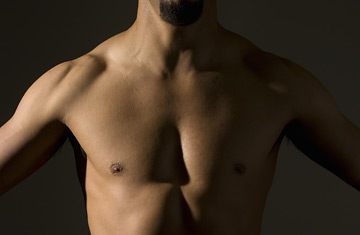
Brian Place didn't think about breast cancer when he found a lump near his left nipple. He thought about rugby. The lump, he figured, might be an injury from colliding with another player.
Place's doctor didn't think much of the lump either, but recommended a mammogram nonetheless. After that came an ultrasound of the breast and a biopsy, and then, finally, a diagnosis: breast cancer. "I was completely numb," says Place, 41 at the time. "I let my colleagues know," he says — mostly men, as he's a communications technician for the Royal Air Force in Britain. "They were as dumbfounded as I was." Even at his local breast clinic, when Place would arrive, he says, some staff assumed he was accompanying a female patient.
The confusion is understandable. Only a tiny fraction of breast cancers diagnosed — less than 1% — occur in men. And because it happens so infrequently, much is still unknown about male breast cancer. "In women, we have studies based on hundreds of thousands of patients," says Dr. Larissa Korde, staff clinician at the National Cancer Institute's clinical genetics branch. For men, there are simply no studies of that scale. Though much can be extrapolated from research in women, Korde says, often "it's a little bit harder to make recommendations for men based on evidence."
Perhaps the surest risk factor — in both women and men — is family history. By the time Place was diagnosed, for example, two of his female relatives had died of breast cancer and a third of ovarian cancer. Although there are certainly several genes that contribute to breast cancer, mutations in two of them — BRCA1 and BRCA2 — are known to increase the odds of both breast and ovarian cancers. So while most men might never even meet a man with breast cancer, those who have several relatives diagnosed with it should be on the lookout for signs of their own breast tumors. Studies suggest that certain populations with an unusually high proportion of people carrying BRCA2 mutations — in Sweden, Hungary, Iceland, and among Ashkenazi Jews — may have a higher incidence rate of breast cancer in men.
Survival rates for men and women are similar, adjusting for stage of the disease at diagnosis — but men are more likely to be diagnosed at a later stage. That's probably because women undergo regular screening, Korde says. In men, "because it's not on their radar, [a lump] might not be something they get seen immediately." In men, as in women, treatment usually includes surgery followed by some combination of radiotherapy, chemotherapy and — because almost all men with breast cancer have tumors characterized as hormone-receptor-positive — hormone treatment.
Two years after his diagnosis, Place is well. His mastectomy was a success, and he's opted to stop taking hormone treatment, a relief, he says, because he found the side-effects, including hot flashes, unpleasant. Today he tries to answer questions from male breast-cancer patients in online cancer forums, and talks with people who contact him through the U.K. nonprofit Breast Cancer Care. But there's no doubt that even a relatively positive experience with male breast cancer can be isolating — even for women. As Place looked for information in online forums, he found that women were used to treating breast cancer sites as women's-only safehouses, a place to discuss their bodies with other women. Some, he says now, "can get quite aggressive that we're invading their area, if you will." But as with breast cancer in women, awareness can make the difference.
